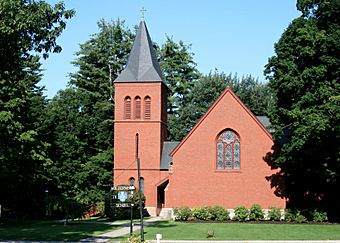Chapel of the Holy Cross (Holderness, New Hampshire) facts for kids
Quick facts for kids |
|
|
Chapel of the Holy Cross
|
|
 |
|
| Location | 45 Chapel Ln., Holderness, New Hampshire |
|---|---|
| Area | less than one acre |
| Built | 1884 |
| Architect | Haight, Charles Coolidge; Head & Dowst |
| Architectural style | Gothic |
| NRHP reference No. | 05000971 |
| Added to NRHP | September 07, 2005 |
The Chapel of the Holy Cross is a historic church found on the campus of Holderness School in Holderness, New Hampshire. It was built in 1884. The chapel was designed by an architect named Charles Coolidge Haight. It is a great example of a building style called Gothic Revival architecture. This building was added to the National Register of Historic Places in 2005. This means it is an important historical site in the United States.
Contents
What the Chapel Looks Like
The Chapel of the Holy Cross is in a special spot at the center of the Holderness School. It is a single-story building made of brick. The longest part of the building faces east and west.
Entrances and Tower
The main doors are on the long south side of the chapel. One entrance faces east and is part of a brick section that sticks out. The other entrance is covered by a wooden porch. This brick section also has a tall, square tower. The tower has three parts and is topped with an eight-sided steeple and a cross.
History of the Chapel
This beautiful Gothic Revival building was finished in 1884. It was designed by Charles Coolidge Haight. A generous gift from Sarah Titus Zabriskie paid for the chapel to be built.
Changes Over Time
The outside of the chapel has not changed much since it was built. One of the biggest changes happened in 1957. The part of the building where the organ is located was made larger. This was done to fit a new organ that the school got from the Castle in the Clouds estate.
Stained Glass Windows
The chapel's original stained glass windows were from the 1800s. They were replaced in the 1930s and 1940s. Some of the new windows were made by the studio of Charles Jay Connick. Other windows came from the All Saints Church in Peterborough. These windows were changed by Connick to fit their new home in the chapel.
See Also
 | Sharif Bey |
 | Hale Woodruff |
 | Richmond Barthé |
 | Purvis Young |



